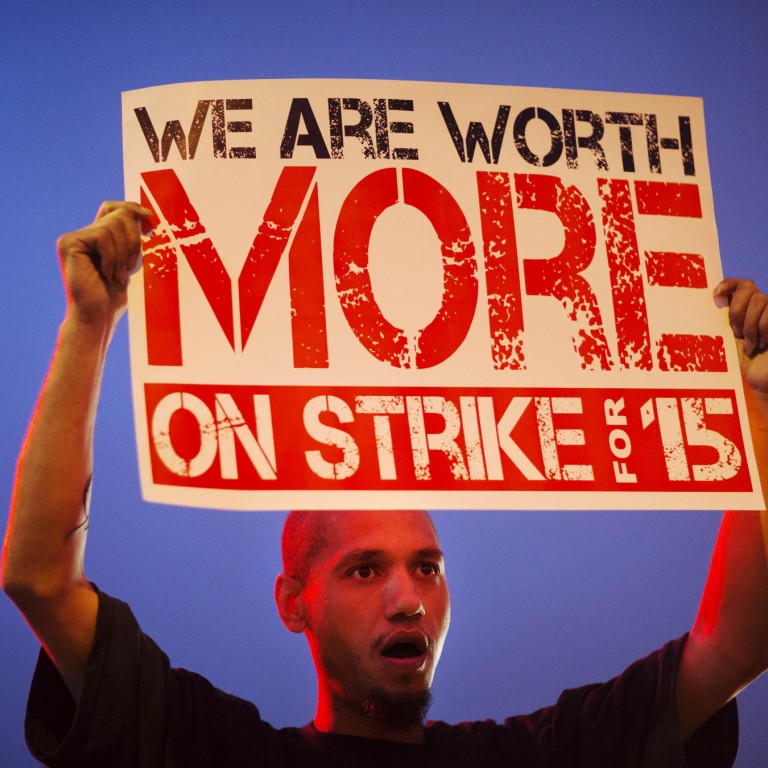
Fast-food workers in global protest to demand higher pay, and union rights
Workers seeking higher wages and union rights take coordinated action against chains such as McDonald's, from Hong Kong to New York
Fast-food workers seeking higher pay have protested around the globe, from Hong Kong to New York, at chains such as McDonald's, Burger King and Wendy's amid a broader debate about raising minimum wages.
Actions were called in 150 US cities on Thursday, including New York, Chicago and Los Angeles, and in more than 30 countries including Germany, Japan and Britain as part of a campaign seeking higher wages and the right to unionise.
The Hong Kong protest took place on Thursday at the McDonald's branch at Star House, Tsim Sha Tsui. About 25 protesters collected 200 signatures for a petition demanding higher pay for workers and handed them to a McDonald's representative.
The worldwide demonstrations were backed by the worker-advocacy group Fast Food Forward and the Service Employees International Union, which represents more than two million members.

A protest there drew about 200 people and lasted about half an hour. Workers chanted and marched before police asked them to move.
The Hong Kong protest, demanding a HK$38 per hour "living wage" for fast-food workers, was staged by members of the Confederation of Trade Unions.

"If we are successful in tackling McDonald's, it will be an example to fast-food chains in Hong Kong and the rest of the world - even more so with their fat profits."
In Atlanta, the Burger King across from Castleberry Hill, a loft development, locked its doors in the face of the protesters at around lunchtime. It opened only to customers and later closed altogether.
A crowd of about 70 marched through drive-through lanes shouting, "We can't survive on US$7.25" to a constant chorus of honking from passing cars and other vehicles.
"I get maybe US$350 every two weeks, and I try to live on that," said Qiana Shields, 35, who has worked there for 10 years.
About 75 protesters marched from a McDonald's in the centre of Miami to a Wendy's a few blocks away.
Bob Bertini, a Wendy's spokesman, said the company was "proud to give thousands of people, who come to us for a starting job, the opportunity to learn and develop important skills".
Burger King said in a statement that it "respects the rights of all workers".
Becca Hary, a spokeswoman for McDonald's, the world's largest restaurant chain, did not immediately respond to a message seeking comment on the strike.
Franchise owners at Domino's set their own wage rates, spokesman Tim McIntyre said.
Fast-food workers in the US make about US$9 an hour, or US$18,880 a year, if they work full-time, according to data from the Bureau of Labour Statistics. The federal minimum wage is US$7.25.
Increasing labour costs "is not the comprehensive solution to income inequality" and will "only hurt business owners' ability to create entry-level jobs", the US National Restaurant Association said in a statement.
Nationally in the US, minimum-wage increases have drawn opposition from businesses groups, which argue that it makes them more reluctant to hire. The Congressional Budget Office estimated the effect on employment from a national increase to US$10.10 would be anywhere from a "very slight reduction" to as many as one million lost jobs.
